Saturday, August 05, 2006
A big blow for democracy in Mexico
This is a terrible decision. There have been clear cases where the initial vote tallies did not correctly match the actual ballots cast. There was no sytematic and representative audit of the vote tally to see if there were errors or biases in the system. And in a full 20% of voting centers the party that lost, the PRD, did not have any observers making it impossible for them to know for sure there wasn't fraud there.
Based on this decision it appears we will never know for sure if the results are accurate. Felipe Calderon, who didn't have much of a mandate to begin with, now has a victory tainted with doubt to boot. Lopez-Obredor has been leading protests in Mexico City demanding a full recount. Will these protests now exand, turn violent, or simply fade away with time? It's hard to know. But this court sure didn't do Mexican democracy, which has only recently emerged from decades of widely acknowledged vote manipulation, any favors. A lot more construction will have to be done, and maybe even some demolition too, before Mexico can be viewed as a true democracy.
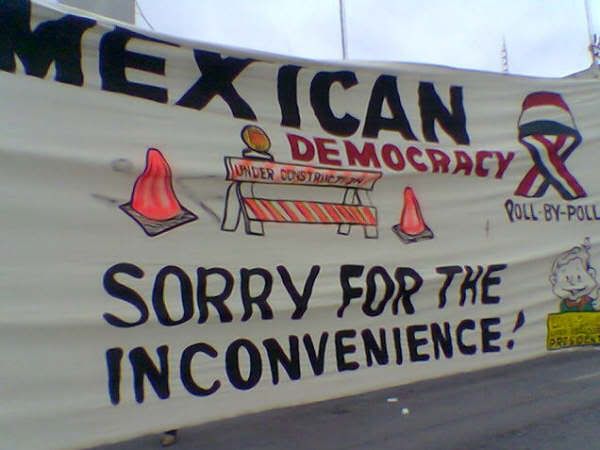
A banner put up by protesters blocking a street in Mexico City this past week.
|
Friday, August 04, 2006
Producing not just oil, but the ships to transport it.
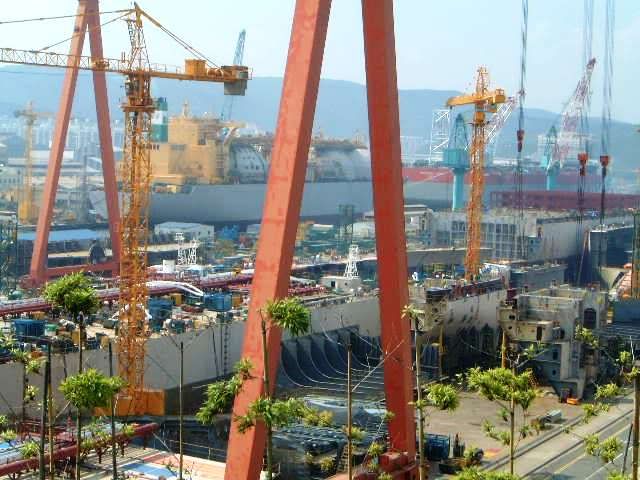
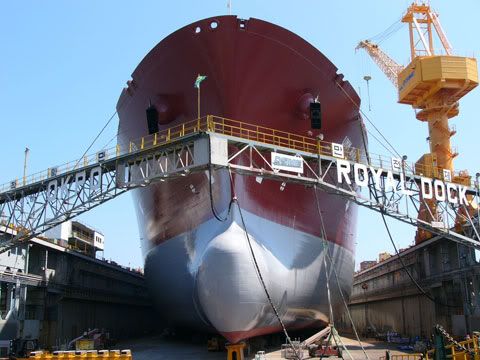
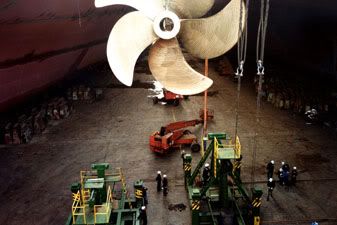
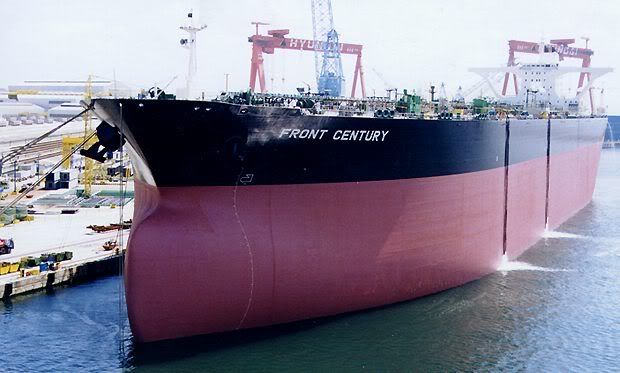
Maybe.
I mentioned this the other day in the comments section but Venezuelanalysis wrote more on it and I think it is significant enough to merit its own post. Venezuela will apparently be getting into the ship building industry:
Venezuela and Brazil to Build Shipyard in Venezuela
By: Steven Mather - Venezuelanalysis.com
Caracas, Venezuela, August 3, 2006—The Venezuelan state oil company PDVSA yesterday signed a memorandum of understanding with Brazilian construction company Andrade Gutierrez SA to build a shipyard in Venezuela that would help maintain the 42 new oil tankers it intends to build by 2012.
This is all part of a wider diversification plan to reach new markets and to reduce the dependency on the international transport companies with their widely fluctuating prices, “PDVSA takes one step further towards exporting its crudes and derivatives and attractive prices in important markets such as those in Asia…and minimize our dependence on the international transport of hydrocarbons,” Chávez said.
Venezuela currently has sixteen tankers which transport only twelve per cent of crude exports. By 2012 it hopes to be producing 5.18 million barrels of oil a day as opposed to the current 3.3 million. The additional 42 tankers would mean that 45% of petroleum exports would be transported by state owned tankers. The project should begin next year and although the exact location has yet to be revealed it is expected to be in the east of the country.
PDV Marina will also explore the possibility of building three or four special vessels that would transport liquid natural gas that is expected to be exploited with Russian assistance within the next few years.
“Within ten years we will be witness to an unprecedented jump in the heavy and light industry of the country, allowing us to penetrate new markets in the maritime industry in line with the strategy of PDVSA and the national government,” he added
Asdrúbal Chávez, the Manager of Trade and Supply of PDVSA and President of PDV Marina, the subsidiary of PDVSA involved in the agreement, said that this would be the first time that cutting edge technology for the fabrication, maintenance and repair of tankers and offshore platforms has been introduced to Venezuela.
Andrade Gutierrez SA is an international leader in marine construction with 60 years experience. The Managing Director of Industrial Business Pedro Antonio Dias was satisfied with the agreement and recognized it as a step down the road of regional integration, “We celebrate working with PDVSA a contribution to the maritime development of Venezuela under the framework of the integration project.”
The project should not only mean the diversification of external markets. The national economy should benefit too, as supply industries will be required. PDVSA expects that factories involved in the manufacture of parts for the construction work will be generated as well as design centers. These new industries will not be temporary and will remain to service future contracts.
Of course there are lots of questions that would be nice to have answered about this. Where will the shipyard be built? What will be its capacity? When do they foresee it building its first ship? Are there Venezuelans with the necessary skills to run it? Will they build ships other than oil tankers? Will they leverage their contacts to get sales of these ships to other OPEC members and China?
Still I would like to be optamistic about this. I have actually always thought ship building would be a good thing for Venezuela to get involved with. I'm not sure why exactly, but I think because it is one of the most prominent industries that South Korea developed during its industrialization push and South Korea has always been a role model I would like to see Venezuela emulate. Rest assured, I will do everything I can to follow this closely and will update any new information on it as it becomes available. In the mean time, here is wishing this exciting new project much success.
|
You know things are bad when...
All the while their boss, Donald Rumsfeld, just sat between them looking perplexed. Of course, the Donald (and when you have an almost $500 billion dollar budget and have a few countries under your thumb you are the REAL Donald, not that idiot running some reality show)got his dander up when the esteemed Senator from New York challenged him for always having given rosy assessments of the war. The Donald took great umbrage and said he had never offered rosy assessments. Of course not, it wasn't he who said deploying "several hundred thousand" troops to properly control the control was way off the mark. It wasn't he who said Iraq could be rebuilt with its own oil revenues. It wasn't he who said U.S. troops would be welcomed as liberators. It's a Friday and I don't have time to look up exactly what he did say so I guess I'll just have to take his word for it.
anyways, I am meandering. What I really wanted to say was that for those of you who don't have C-span and missed the testimony there is another way you could get a feel for what is really going on in Iraq. You could simply read this story:
CAMP ANACONDA, Iraq - The U.S. military is increasingly using air lifts instead of ground convoys to resupply troops to avoid the deadly roadside bombs that remain a major killer of American soldiers after more than three years of war.
The 3rd Corps Support Command, which supplies units throughout the country, has made air shipment its No. 1 priority since arriving last October at Camp Anaconda, 50 miles north of Baghdad.
"When we first got here, all of our stuff was shipped out by ground," said 1st Lt. Ted Mataxis, 29, of Raleigh, N.C., whose unit is responsible for assembling Humvee tires, engines and other repair parts for air transport.
Now "we're sending the majority of our stuff by air," he said. "The only stuff that goes out by ground are the big, bulky items."
In October, the command moved about 6,500 pallets - the platform that items are loaded onto - by air each month. The monthly figure now stands at about 16,000.
The increase of air shipments means about 33,000 vehicles and 71,000 troops who would have been driving convoys around Iraq's dangerous highways have been taken off the roads.
It is unclear how many soldiers have been killed by roadside bombs - known here as improvised explosive devices, or IEDS - while on supply convoys. According to the Web site icasualties.org, roadside bombs against all types of convoys have accounted for 926 of the 2,044 hostile fire deaths among U.S. forces since July 2003.
Army officials here have no doubt that the air effort has saved lives.
"Any time you go outside the wire, anything can happen," said Maj. Doug A. LeVien, 34, from Brooklyn, N.Y., with the 548th Logistic Task Force. "All battalion commanders try to minimize how often you have to go out. If you don't have to go out, that's a win. Those are numbers that don't show up in box scores."
That sure sounds like an effective military strategy, just stay in your bases and hide. After all: "If you don't have to go out, that's a win." So if they all just stay in their bases for a few months maybe they can rack up enough wins to just declare victory and come home. I bet the Iraqi's would be happy.
|
Thursday, August 03, 2006
Even symbolic acts count
Similarly, the Israeli attack on Lebanon that cries out for protest. The great majority of us have little ability to affect events there - but speaking out is still an imperative.
For that reason, Venezuelans can today feel very proud of their government. In a largely symbolic act they withdrew their ambassador to Israel in protest of Israel's continued attacks on a largely defenseless civilian population. Said Chavez:
"It really causes indignation to see how the state of Israel continues bombing, killing ... with all of the power they have, with the support of the United States,"
"Indignation"? That is certainly an understatement from a person well known for bombast. Nevertheless, Venezuela is standing up and making its postion known to all the world. Good for them. That more people throughout the world would have such courage.
|
Wednesday, August 02, 2006
Inhuman "doctors"
Sadly, that was probably anything but an isolated incident. Today we learn (hat tip to Flanker) that a former government official, Jorge Rodriguez, was denied emergency medical care at a private clinic after a traffic because he was probably thought of by the medical personnel their as being pro-Chavez. That medical care would be denied simply because of politics is so disgusting and so outrageous it's hard to know where to begin. But if the details of this are corroborated a good place to start would be to shutter the private clinic involved and have the licenses of the doctors involved revoked. People who lack basic human decency and compassion shouldn't be practicing medicine.
|
The chocolate revolution
Venezuela's chocolate revolution
By Greg Morsbach
BBC News, Ocumare
Deep inside Venezuela's tropical forest a quiet revolution is taking place.
In the shade of the trees, pink cocoa pods ripen ready for the next harvest in early November.
The pods carry a white, sticky pulp and the cocoa beans, which are used to make chocolate.
The type of agriculture being used just outside the village of Ocumare de la Costa, is having a big impact on the farming community and its families.
Ocumare is just one of several communities in Venezuela to have switched from conventional to organic farming and they are now reaping the rewards.
Organic farmers
Jose Lugo spends five hours a day nurturing his three hectares of cacao trees to protect them against pests, insects and bad weather.
"We don't use any artificial fertilisers, just natural compost," he says.
"It's twice as much work as before but it's definitely worth it."
However, the financial rewards help compensate for the extra work because organic cocoa beans fetch up to four times as much as ordinary beans.
Mr Lugo and his friends now earn about $7 (£3.75) for a kilogramme of beans, whereas they used to get paid just less than $2 for conventional produce.
They no longer sell their cocoa to local intermediaries, which have been priced out of the market, but straight to foreign chocolate manufacturers, which are willing to pay high prices for organic produce.
The farmers have joined forces to form an association of organic farmers consisting of 50 families.
Organic converts
Behind the thick white walls of the association building, the cocoa seeds are fermented for six days in large wooden boxes.
Trina Arevalo says the seeds are then dried in the sun and points to several clusters of brown beans lying on the patio.
"We keep the cocoa beans here on the yard for six days," she says.
"Then they are cleaned, sorted and weighed. Finally, they're put into large sacks ready to be exported."
It seems like a lot of hard manual labour, particularly during the rainy season when floods can wipe out the crops.
Only a week ago, the river burst its banks and destroyed several hectares of fledgling cocoa plants.
Yet, in the last three years their annual cocoa production has doubled from close to 20 tonnes to more than 40 tonnes, Mrs Arevalo.
"At first we didn't want to know anything about organic agriculture. It seemed too much fuss. But you see that we've been converted."
Single-bean cocoa
Much of the funding to kickstart this new wave of organic farming came from the Venezuelan government, which has injected some $10m on research and training, as well as from the European Union via a local non-governmental organisation called Tierra Viva.
The world's chocolate gourmets are looking to Venezuelan beans.
Word has reached European and North American chocolate makers that this Latin American country is the hottest place on the organic chocolate map.
Several Italian, French and American chocolate manufacturers are buying organic beans from Venezuela.
Like with exclusive claret wines or single malt whiskies, what the experts value the most is the "single bean origin" label to denote aroma and purity, and Venezuela can offer just that.
Andrea Trinci, who owns a chocolate factory and shop in Tuscany, recently visited Venezuela.
"Venezuelan cocoa is very fine, elegant and persistent in its aroma," he says.
"I would like to see more and more organic cocoa being exported, but only at a just price."
Local production
The local cocoa producers are now making forays into the production of their own chocolate bars.
Five kilometres down the road from Ocumare lies the seaside village of Cata, where a handful of cooperatives have started making their own organic chocolate.
The sweet smell of melting chocolate greets visitors as they enter one of the cooperative shops.
Saturmina Diaz is one of six local women involved with the project, part-funded by the government and local charities.
"We offer a wide range of products such as chocolate punch, wine and pudding," says Mrs Diaz.
"Lots of foreign tourists come here to ask us whether we're exporting our merchandise, but so far we haven't had the financial means to do this. But that's the next logical step for us."
Facing the world
The cocoa producing zones of Venezuela, dotted along the Caribbean Coast and Lake Maracaibo, have gone through something of a revival.
Only a few years ago plantations and farms lay abandoned, following a series of poor harvests and droughts.
However, the roots of cocoa industry's decline can be traced back a long way.
William Harcourt-Cooze is a British cocoa farmer who bought land in Venezuela back in the 1990s.
"Prior to the discovery of petroleum here and the subsequent oil boom in the thirties and forties, cocoa was Venezuela's number one export," he says.
"But the government of President Chavez is aware that cocoa could once again be one of the country's main exports."
Driving around some of these old cocoa communities, with their colonial-style churches and village squares, there seems to be a new sense of pride and purpose in people's faces.
As one elderly farmer puts it, with a smile on his face:
"The world is talking about us again. I've waited a whole lifetime for that to happen. Sometimes I felt like throwing in the towel, but now I'm glad I didn't."
This is exactly the type of thing Venezuela needs to do more and more of. And they are.
|
Tuesday, August 01, 2006
On the path to a more equitable and just society bearded dictators aren't needed.
Castro indeed probably is very sick for him to have turned over power. The crowds in Miami are already celebrating what they hope is his immenent demise. I don't wish death on anyone, even if they are a ruthless dictator.
But the topic of Fidel Castro is important, all the more so because of Cuba's and Venezula's close relationship. That relationship leads some to believe that Cuba and Venezuela are the same, that Castro and Chavez are the same, and that their political systems are the same. In reality none of that is even remotely true.
In Venezuela we have a country where all human rights - freedom of speech, of association, of the press, of religion, of travel and on and on - are respected by the government. It also posses a government which gains its legitimacy from free elections. In turn that government is trying to build a more just and equitable society with a higher standard of living and more opportunity for its citizens.
All of that stands in marked contrast to Castro's Cuba. That country has no personal liberties, no respect for many human rights, no free elections and has now had the same self-selected leader for almost 50 years. Yet, in something that is extremely ironic, that government enjoys the support of some on the left in Venezuela and throughout the world. I have to say, I have never really been able to grasp what that support is based on.
Yes, the Cuban government over the years has done some things to help the poor - yet the country as a whole is still very poor. Yes, Castro helped overthrow a terrible U.S. backed dictatorship - but I don't see how that should entitle him to establish his own dictatorship. Sure, Cuba is famous for its literacy campaigns - but what is the point of teaching people to read but not letting them think or express themselves freely? In looking over the past half century it's hard to see how anyone thinks the positive achievements of that "revolution" still outweigh its very obvious failures.
What is more, Castro has caused tremendous harm not only to the Cuban people but to many others throughout the world. He has done this by causing so many people to equate progressive ideas and "socialism" (however we define that) with political repression. This is a disaster for the left. Once Cuba becomes a democracy it will probably be generations before the left will be able to make any inroads there as people will still link the ideas of the left with the horrors of the Castro regime.
Those on the left who have backed that dictatorship have made a huge error. First, in backing a dictatorship they give up the moral high ground and wind up in the sub-basement. Second, we shouldn't lose site of the extreme irony involved in those on the left turning away from democracy when poor and working class people are the majority the world over. If the left can't win one person one vote elections then it needs to look in the mirror and adjust it's program, not snuggle up to dictators. And even if some on the left don't see that those on the right sure do:
Many years ago, Roger Maris, member of the Nacional Security Counsel of the U.S. said: “Henry Kissenger considered Allende a much more dangerous threat than Castro. If the consciousness of Latin America was awakened some day it wouldn’t be because of Castro. It was Allende that was the living example of social reform and democracy in South America. There were ocurring disasterous events in the world at that time, but only Chile frightened Kissinger”
The economic success, democracy, and social justice of Chavez's Venezuela is the future, not the failed Castro dictatorship. The sooner that failed model of "socialism" disappears to be replaced with the new one being build in Venezuela, the better.
|
Monday, July 31, 2006
The U.S. financed slaughter of innocents continues
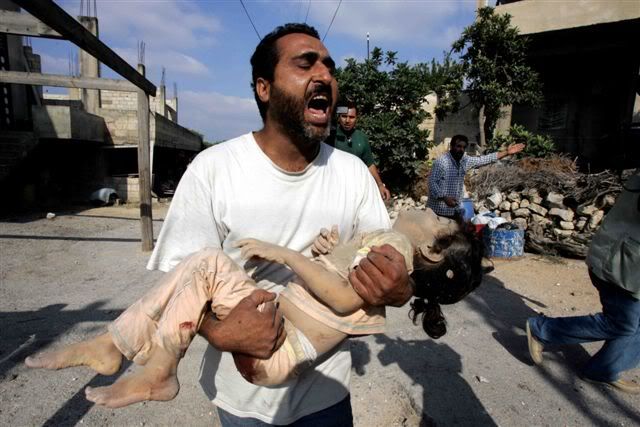
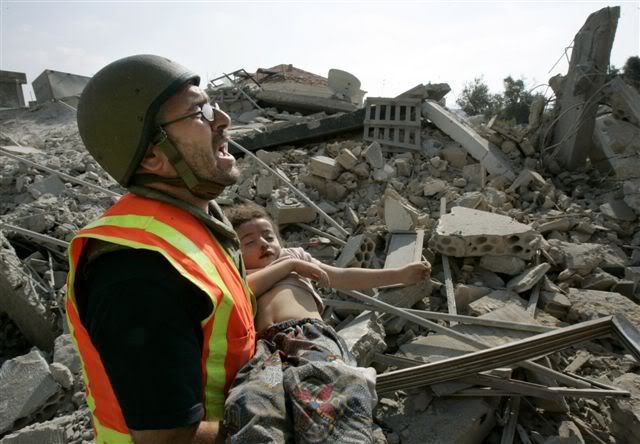

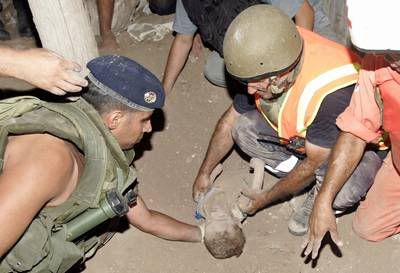
The Israeli government claims it is "investigating" this "mistake". I won't hold my breath waiting for the investigation to say anything other than it's all Hezbollah's fault. And the Israeli 48 hour cessation of bombing apparently lasted a hot New York minute. Thats the thing about the American and Israeli governments - if you expect them to lie and go back on their word you'll never be dissapointed.
I would like to just make one additional observation right now on this madness. Israel claims this all began because Hezbollah crossed the Irsaeli border and killed some soldiers. Maybe that's true, maybe not. Thing is, Venezuela has had some of its soldiers killed by Colombian paramilitary forces that crossed into Venezuela. Yet I can't ever seem to recall Venezuela responding by bombing Bogata or Medellin. I guess it's like Chavez once famously said to the U.S. ambassador in Caracas - "Here we are different". Indeed. And thank god for that.
|
Sunday, July 30, 2006
The numbers behind the numbers
CARACAS, Venezuela — The lease that Vanete Barr and her husband signed for an apartment here in October 2004 didn't seem like a bargain at the time, given the huge number attached: $3,500 a month.
But even with the Barrs paying that lofty sum, it certainly looks like a steal these days.
Rents have since doubled in her building in the expensive San Roman neighborhood, which is popular with foreigners. Prices have risen 60% in the mid-priced El Rosal and La Castellana barrios that cater to natives. And similar increases have registered in the blue-collar zones of Sucre and Baruta, brokers say.
"This place is becoming more expensive than Manhattan," said Brazilian-born Barr, whose American husband works for a Texas-based oil drilling firm. She keeps tabs on the market and helps arriving couples in her husband's company to find housing. "It's because business is going really well here."
Rising housing costs have cast a pall in the city otherwise prospering with new wealth. With the South American country expected to reap more than $50 billion in crude oil sales this year, President Hugo Chavez is liberally circulating the proceeds abroad and at home.
Just this week he joined Russian President Vladimir V. Putin at the Kremlin in announcing a deal to buy Russian military aircraft as part of a long-term package of contracts worth $3 billion.
Chavez also has used Venezuela's oil windfall to wield influence closer to home, offering fuel under preferential terms to his Caribbean neighbors.
But here in the capital and in other urban areas, the influx of petrodollars is contributing to a superheating of the housing market and virtually every other good or service.
Although the Chavez government has largely been able to contain inflation by subsidizing food and keeping a tight rein on monetary supply, real estate prices in many neighborhoods have rocketed because of a housing shortage. Brokers and economists say it could last many more months, even years.
Chavez has taken measures to encourage housing demand, especially among the poor, but his socialist policies have scared away builders, creating a classic market imbalance: Too many renters and buyers are chasing too few available apartments and houses, and prices in many neighborhoods are going through the roof.
Apartments at any price are hard to find, said Pilar Szabo, a real estate broker with Century 21-Mi Casa. She said Century 21's listings, covering two-thirds of this city of 4 million residents, showed only seven apartments available at rents of $2,500 a month or less. And with little new construction underway, prospects for price breaks are dim, she said.
As long as oil prices stay high, Venezuelans probably will keep spending. The economy has grown at a 9% clip in the last year and a half, and the Chavez government has boosted government spending 40% this year from last. It has expanded public works and added hundreds of thousands of Venezuelans to the government payroll, many of them working in low-paying social outreach projects called "missions."
The result has been a 30% rise in consumer spending in the first five months of 2006 from the same period last year, according to a new AC Nielsen audit of Venezuela store sales. Purchases of clothing and other household items are up by 39%, alcoholic beverages by 28% and general foodstuffs by 38% in stores monitored by Nielsen.
Demand is so strong that customers have to wait as long as eight months to buy cars and trucks at Caracas dealerships.
"The consumption boom we are witnessing is typical of oil boom periods, as seen both in Venezuela's past and in other countries.
"But this time is much more dramatic," said Francisco Monaldi, an economist with the Institute of Advanced Administrative Studies in Caracas.
Ordinarily, the spending binge would be expected to cause rising inflation, but just the opposite has been the case.
The Chavez government brought inflation down to about 11% this year from 14% in 2005 and is promising a single-digit rate next year.
How does Chavez do it? He uses much of his oil wealth to subsidize the prices of basic foodstuffs sold through the government-run Mercal retail chain, which accounts for 50% of grocery sales in Venezuela. The government buys pasta, sausage, cooking oil and frozen chicken at wholesale, usually from foreign suppliers, then sells the goods at the 13,000 Mercal outlets at an average 35% discount to traditional store prices.
Inflation also is contained by central bank policies that drain as much cash as possible from the money supply. The bank does that by buying bolivars on the open market to boost their value and by selling bonds at high interest rates to banks, creating an incentive for them to shed cash.
But Chavez's moves have been less successful at keeping housing prices under control. The culprit, experts say, are policies that are at odds with one another.
On the one hand, Chavez has required banks to devote a larger portion of their loan portfolios to mortgages for low-income borrowers.
And through the National Housing Council, he has begun awarding subsidies of as much as $20,000 per family. Most days, hundreds of applicants line up outside the council offices on Avenida Principal de Las Mercedes here, hoping to receive checks.
On Tuesday, a married couple in their 40s named Doris and William were in line to complete a mortgage on a three-bedroom house the government gave them free of down payment after their previous home in the Catia slum was destroyed by floodwaters.
"We were left out in the cold," said Doris, who declined to give her last name.
The couple said the council, known by its Spanish acronym Conavi, gave them an additional credit with which the neighborhood cooperative could make and transport candies.
The number of houses subsidized by Conavi through May of this year had exceeded 10,000, after more than 9,800 units were awarded last year.
High-end demand for houses has been ratcheted up by a new wave of incoming Chinese, Russian, Brazilian and Iranian executives who have come to work on petroleum joint ventures and cooperatives with the Venezuelan government.
But at the same time, Chavez's socialist policies have made builders reluctant to construct apartment and condo towers for fear they may lose their investments through confiscation.
A pillar of his "socialism for the 21st century" is the redistribution of "nonproductive" land and buildings to the poor. Squatters have taken the policy as a signal to take over hundreds of farms and buildings since Chavez became president in 1999, including apartment buildings in downtown Caracas.
In recent months, officials are said to have recognized the country's housing supply problem and have toned down the confiscatory rhetoric. They have arrested "professional squatters" who during the early years of the administration took over apartment buildings during renovation or construction and then redistributed them to others, often for a fee.
Nevertheless, real estate owners are still hearing worrisome signals. In a recent interview with El Nacional, a Caracas newspaper, Juan Carlos Loyo, the head of the National Land Institute, said that as many a million acres of vacant or underused land might be "rescued" this year and given to landless poor.
In any case, the housing supply in and around Caracas has not risen appreciably in five years, said Szabo of Century 21, noting, "It's not a good investment environment for someone thinking about investing millions of dollars in a project." [Note: The reporter may not have noticed it but Caracas is in a valley surrounded by mountains so if little is being built there it is because there is barely a square inch of undeveloped land - OW]
Lets see. A rise in consumer spending of 30% so far in 2006 compared to 2005 (keep in mind 2005 itself was a banner year). Clothing and household items are up by 39%. And general foodstuffs are up by 38%. Yup, that will send a politicians numbers through the roof. After all, people do tend to vote for politicians who improve their well being, and Chavez certainly is doing that!
And for those of you in the U.S. desperate to speculate in housing but watching the air slowly seep out of the U.S. housing bubble there is always Caracas.
|
